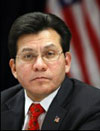| Alberto Gonzales, the nation's first Hispanic attorney general, announced his resignation Monday, driven from office after a wrenching standoff with congressional critics over his honesty and competence. Republicans and Democrats alike had demanded his departure over the botched handling of FBI terror investigations and the firings of U.S. attorneys, but President Bush had defiantly stood by his Texas friend for months until accepting his resignation last Friday. "After months of unfair treatment that has created a harmful distraction at the Justice Department, Judge Gonzales decided to resign his position and I accept his decision," Bush said from Texas, where he is vacationing. Solicitor General Paul Clement will be acting attorney general until a replacement is found and confirmed by the Senate, Bush said. Homeland Security chief Michael Chertoff was among those mentioned as possible successors, though a senior administration official said the matter had not been raised with Chertoff. Bush leaves Washington next Monday for Australia, and Gonzales' replacement might not be named by then, the official said. "It has been one of my greatest privileges to lead the Department of Justice," Gonzales said, announcing his resignation effective Sept. 17 in a terse statement. He took no questions and gave no reason for stepping down. Bush said the attorney general's "good name was dragged through the mud for political reasons." Though some Republicans echoed the president's veiled slap at Democrats, Gonzales had few defenders left in Washington. Many Republicans actually welcomed his departure, some quietly and others publicly so. Congressional aides and lawmakers agreed that any nomination of a new attorney general was almost certain to be acrimonious. The easiest prospects, some said, might be a current or former colleague of senators charged with the confirmation. Sen. Arlen Specter, the ranking Republican on the Judiciary Committee, told reporters Monday that he would not accept the job, if offered. But, he said, another current or former senator "might be just the ticket." "If you have a former senator or a present senator or somebody who is well known to the Senate or the committee...that's always a big help if you know the person," Specter told reporters in a telephone call as he traveled from Warsaw to Paris. Asked, too, about whether Chertoff might be a good candidate, Specter replied: "I think he's a first-rate prospect." Democratic presidential candidate John Edwards applauded Gonzales' resignation, saying it was "better late than never." The announcement came as a surprise to many in the administration. Gonzales was tight-lipped about his thinking before going on vacation more than a week ago and aides were planning events for the next several months. After spending time with his family in Texas, however, and facing the prospect of returning to Washington for months of continued fights with Congress, he called the president on Friday. The White House has asked anyone staying past Labor Day to stay the remainder of the president's term. Gonzales, formerly Bush's White House counsel, served more than two years at the Justice Department. In announcing his decision, Gonzales reflected on his up-from-the-bootstraps life story; he's the son of migrant farm workers from Mexico who didn't finish elementary school. "Even my worst days as attorney general have been better than my father's best days," Gonzales said. Bush steadfastly — and at times angrily — refused to give in to critics, even from his own GOP, who argued that Gonzales should go. Earlier this month at a news conference, the president grew irritated when asked about accountability in his administration and turned the tables on the Democratic Congress. "Implicit in your questions is that Al Gonzales did something wrong. I haven't seen Congress say he's done anything wrong," Bush said testily at the time. Actually, many in Congress had accused Gonzales of wrongdoing. After the 52-year-old Gonzales called Bush Friday, the president had him come to lunch at his ranch on Sunday as a parting gesture, a senior administration official said. Gonzales, whom Bush once considered for appointment to the Supreme Court, is the fourth top-ranking administration official to leave since November 2006, following Defense Secretary Donald H. Rumsfeld, Paul Wolfowitz, who had a high-ranking Pentagon job before going to the World Bank as its president, and top political and policy adviser Karl Rove. Senate Judiciary Committee Chairman Patrick Leahy, D-Vt., reacted to the announcement by saying the Justice Department under Gonzales had "suffered a severe crisis of leadership that allowed our justice system to be corrupted by political influence." As attorney general and earlier as White House counsel, Gonzales pushed for expanded presidential powers, including the eavesdropping authority. He drafted controversial rules for military war tribunals and sought to limit the legal rights of detainees at Guantanamo Bay — prompting lawsuits by civil libertarians who said the government was violating the Constitution in its pursuit of terrorists. "Alberto Gonzales was never the right man for this job. He lacked independence, he lacked judgment, and he lacked the spine to say no to Karl Rove," said Senate Majority Leader Harry Reid, D-Nev. In a warning to the White House, Reid suggested that investigations into the Justice Department will not end until Congress gets "to the bottom of this mess." One matter still under investigation is the 2006 dismissal of several federal prosecutors, who serve at the president's pleasure. Lawmakers said the action appeared to be politically motivated, and some of the fired U.S. attorneys said they felt pressured to investigate Democrats before elections. Gonzales maintained that the dismissals were based the prosecutors' lackluster performance records. In April, Gonzales answered "I don't know" and "I can't recall" scores of times while questioned by Congress about the firings. Even some Republicans said his testimony was evasive. Not Bush. The president praised Gonzales' performance and said the attorney general was "honest" and "honorable." In 2004, Gonzales pressed to reauthorize a secret domestic spying program over the Justice Department's protests. Gonzales was White House counsel at the time and during a dramatic hospital confrontation he and then-White House chief of staff Andrew Card sought approval from then-Attorney General John Ashcroft, who was in intensive care recovering from surgery. Ashcroft refused. Similarly, Gonzales found himself on the defensive as recently as March because of the FBI's improper and, in some cases, illegal prying into Americans' personal information during terror and spy probes. |










